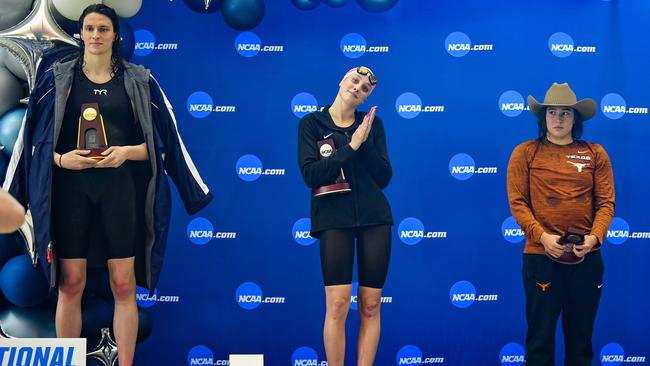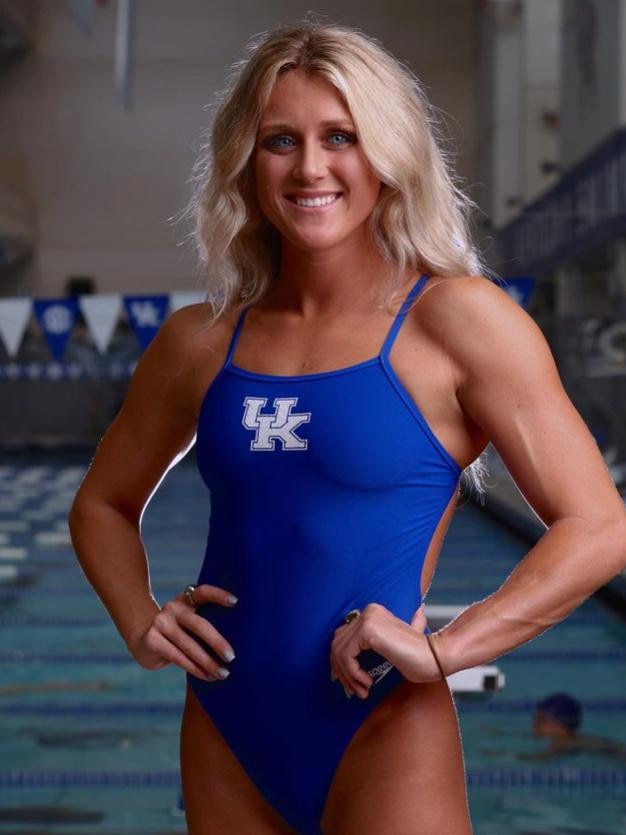Women athletes launch landmark case against transgender inclusion
Sixteen athletes sue the National Collegiate Athletics Association for allowing transgender athletes to compete against them and share locker rooms, with swimmer Lia Thomas at centre of claim.

A group of 16 American women have launched a landmark legal case against the National Collegiate Athletics Association (NCAA) over the participation of transgender athletes in their sports, with their lawyer stating that the organisation has “institutionalised cheating and discrimination” against them.
With a particular focus on Lia Thomas, the transgender swimmer who claimed a NCAA women’s title in March 2022, the group has filed its 156-page claim at the United States District Court in the northern district of Atlanta, Georgia.
It was in Atlanta that the NCAA Division 1 swimming championships took place, with the fact that about 300 women shared a dressing room with Thomas - at the time with “full male genitalia” - cited in the complaint. Thomas claimed the NCAA title in the women’s 500-yard freestyle event, with two Olympic silver medal-winners - Emma Weyant and Erica Sullivan - finishing second and third.
The Olympians are not among the complainants but Bill Bock, formerly general counsel at the United States Anti-Doping Agency and the lead attorney in their cases against Lance Armstrong and Alberto Salazar, is acting for the group, which also includes female athletes from volleyball, tennis and track and field. Bock has told The Times that the “discrimination against female student athletes should disqualify the NCAA from being a sport governing body”.
It represents an unprecedented action against the organisation that oversees college sport in America, and could lead to substantial claims for damages as well as a change in NCAA rules on the participation of transgender athletes in female categories, which have been tightened since 2022. The women also want to be awarded what they consider to be their rightful placing in their respective events which, if successful, would lead to Thomas being disqualified. Central to their claim is an accusation that the NCAA has made a “radical departure from Title IX’s original meaning”, which is the federal civil rights law that prohibits sex-based discrimination in any school or education facility that receives government funding.
In January 2022 the NCAA updated its transgender policies, stating that it had aligned itself to policies in “the Olympic movement”. For participation in 2022, transgender athletes were required to have had one year of testosterone suppression treatment, documenting a one-time serum testosterone level that fell below the maximum allowable level for the sport in which they were competing. The documentation relevant to this had to be submitted within four weeks prior to the selection date for their championship.
From August 1 this year, participation in NCAA sports will require transgender athletes to provide documentation no less than twice annually, including at least once within four weeks of competition, that meets the sport- specific standard.
Olympic sports such as swimming and athletics now exclude transgender athletes, who have experienced male puberty, but the claim filed to the court challenges whether the NCAA policies are indeed fully aligned. The complainants claim the NCAA is only applying one out of multiple criteria, with shorter suppression periods at lower testosterone amounts. “Their form only requires an athlete to provide one testosterone result 28 days before competition, and that is not best practice as demonstrated by multiple international federations,” Bock, who this week resigned from his voluntary position as a member of the NCAA Division 1 Committee, said.
“It is time for each of the NCAA’s sponsors, and for all sports organisations that care about fair competition and safe sport, to recognise the NCAA has institutionalised cheating and discrimination against women and must be reformed.
“We need to hear them speak up for women and disassociate themselves from the NCAA and its conduct.”

The NCAA has been approached for comment.
While four of the women have chosen to remain anonymous for fear of possible repercussions, swimmer Riley Gaines is among those to have put their name to the complaint. She tied for fifth place with Thomas in the 200-yard freestyle event in Atlanta in 2022 and has become a voice in the US against the inclusion of transgender women in female sports categories.
In the complaint for damages, it is detailed that “without notice to female swimmers competing in the 2022 NCAA Championships, the NCAA and . . . one or more other state actors or actors with apparent state authority . . . changed the designation of the locker rooms to be used by the women swimmers . . . to ‘unisex’ locker rooms.
“And directed women swimmers and teams that Thomas was entitled to use all designated locker rooms allocated to the women swimmers and teams.
“This change was made so that Thomas, a fully grown adult male with full male genitalia, would use the same locker rooms to be used by more than 300 female student-athletes, depriving the female student-athletes of sex-separated women’s locker room facilities and bathroom and restroom facilities where their right to bodily privacy could be protected, exposing the women to shock, humiliation, and embarrassment in violation of their constitutional right to bodily privacy.”
The complaint adds that five of the 16 plaintiffs were impacted by this arrangement, adding that they are “entitled to declaratory relief, compensation, punitive damages and attorneys’ fees”.
Speaking to The Times, Bock added: “What the NCAA allowed to happen to hundreds of female athletes in locker rooms in Atlanta two years ago was nothing less than exploitation and a disgraceful violation of women’s rights to bodily privacy.
“The NCAA’s president, Charlie Baker, and university presidents and athletic directors ought to be called to testify before Congress tomorrow (Saturday).
“The unfair advantage the NCAA gives to male athletes to compete against women is as bad as any doping case I have been involved in. The real March Madness [a reference to the annual NCAA basketball championship] is how the NCAA sold out hundreds of female student athletes.”
Reka Gyorgy, who competed against Thomas for Virginia Tech University, is quoted in the complaint, saying: “I swam the 500 free at NCAA’s on March 17, 2022, where I got 17th, which means I didn’t make it back to the finals.
“I’m a fifth year senior. This is my last college meet ever and I feel frustrated. It feels like that final spot was taken away from me because of the NCAA’s decision to let someone who is not a biological female compete. It hurts me, my team and other women in the pool.”
The Times







To join the conversation, please log in. Don't have an account? Register
Join the conversation, you are commenting as Logout